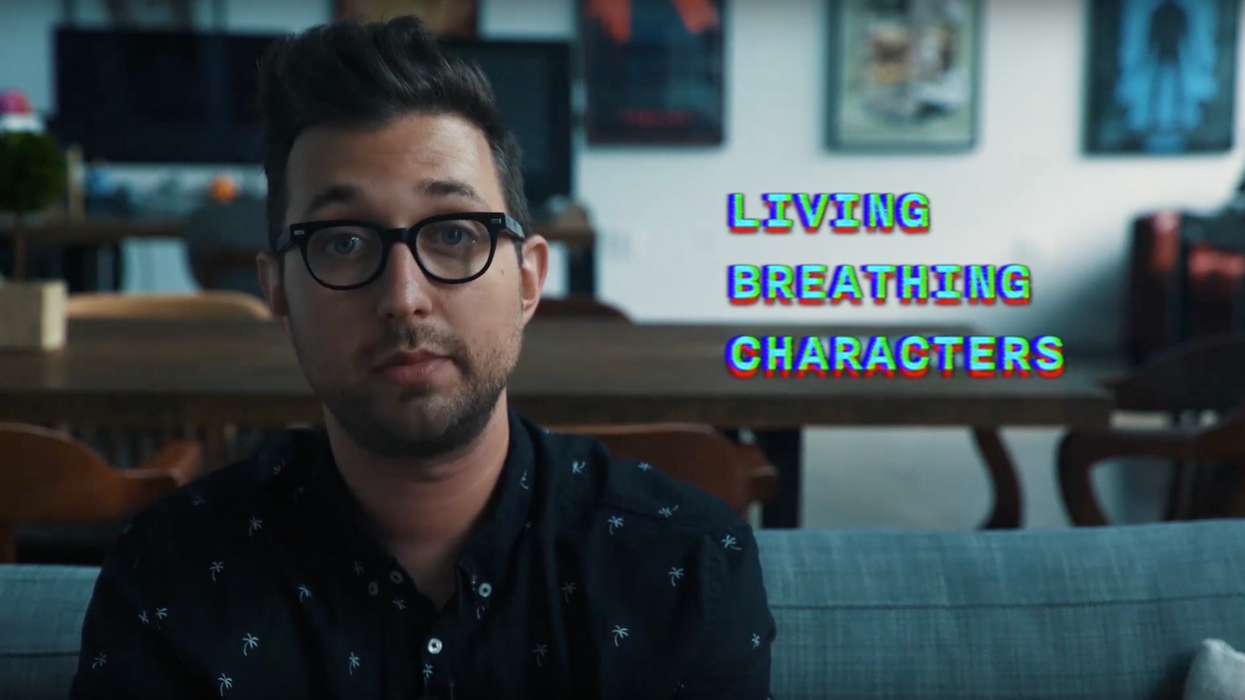'Frivolous and Dumb' Techniques for Writing Good Characters
Writing living, breathing characters is super hard, but these tips should definitely help.

Screenwriting is a tough gig, what with all of the story structuring, world-building, and 3 a.m. ugly crying, but perhaps the most difficult part of it is crafting interesting characters. I mean, I'm 33 and I don't really know or understand myself in any kind of useful way, so how in the hell am I supposed to create an individual out of thin air that is as complex and multi-dimensional as I probably am?
Lucky for us, Film Riot has offered up a sample of Screenwriter Seth Worley's video training series, Writing 201 that teaches a few "frivolous and dumb" techniques that 1.) aren't actually "frivolous and dumb," and 2.) will help you "Make Characters Great Again," like coming up with lyrical, meaningful names to crafting conflict to reveal their inner voice. Check it out below:
Come up with names
The process of giving your characters names might seem trite, but it actually really helps you get a better picture of who they are. Darth Vader would not be as ominous and menacing without his name. Norma Desmond just sounds like a starlet who's brilliance is quickly being extinguished by the ravages of age, right? And Bob Loblaw...sounds....
So, scour those baby name sites. Look up their meanings to see if any of them speak to who your character is. Pay attention to how the name sounds when spoken aloud. Again, the sound of "Darth Vader" is like the sinking feeling you get when you hear your dad pull into the driveway while you're in the middle of trying to hide his favorite Boston record that you just broke in half. And Bob Loblaw...sounds...
Copy yourself
Okay, maybe you're thinking that you're not the most creative person in the world and just can't seem to come up with an original character. So what? Just copy yourself. I mean, even if you're like me and don't really know yourself as well as you think you do, you probably know yourself better than you know anyone else.
Giving your character all of your own opinions, ideas, issues, and philosophies will make it easier to know their motivations, goals, wants, and needs. It'll also be easier to understand them on an emotional level because, if you're a bit of a self-centered narcissist like pretty much everyone everywhere, you'll be able to easily empathize with them.

Copy your enemy
Every story needs a good antagonist and who better to represent the malevolent butthole who wants to destroy everything your sterling hero represents than the opposite of you. Take a look at your hero and just start writing down qualities and opinions that are the opposite of what they have. If your hero is self-sacrificial, then your villain will be selfish. If your hero is open-minded, then your villain will be intolerant.
Keep in mind, though, that writing multi-dimensional characters requires a bit of grey because no one exists in black and white. Your hero will have their weaknesses and failings and your villain will have their strengths and trauma. In the end, if you do this whole "copy yourself/copy your enemy" exercise, you will most likely learn that your hero and your villain are just two sides of yourself. Surprise!
Write contrasting characters
Contrast is imperative to craft good characters, as well as a good story. Putting two similar characters together to solve a problem is repetitive and doesn't push either individual to change because their different approaches to attaining their goals probably don't conflict with each other. For example, imagine having two characters who are trying to bake a cake: if they're similar, they'll both agree that following a recipe is a good idea, but if they're contrasting, one will want the recipe while the other wants to figure it out on their own. Good drama, even for cake baking.

Throw conflict at your characters
Now that you have two contrasting characters, you have to unload magazine after magazine of conflict at them. According to Worley, this will help your characters find their voice. Really, how much can you really know about your character, or anyone for that matter, if you haven't seen how they act under pressure? So, give your characters a problem to solve and see where all that problem-solving takes you. Most likely, you'll naturally begin to write some pretty interesting things about your characters that you never even thought to include in their 80-page character analysis.
If you liked the video and want more of its gooey goodness, you can purchase Worley's full Writing 201 course on Triune for $75. Also, if you like writing aids and tools, Worley's company, Plot Devices sells a ton of great screenwriting resources that will help you organize and conceptualize your ideas, like the Storyclock and Storyboard Notebook (both $10), as well as the new Storyclock Workbook ($25).
Source: Film Riot











